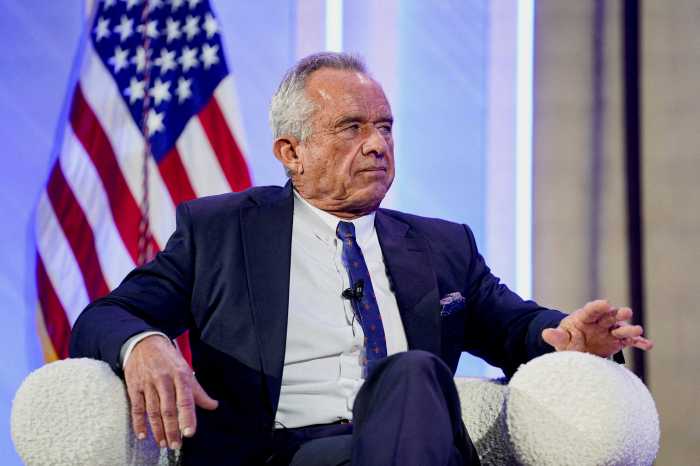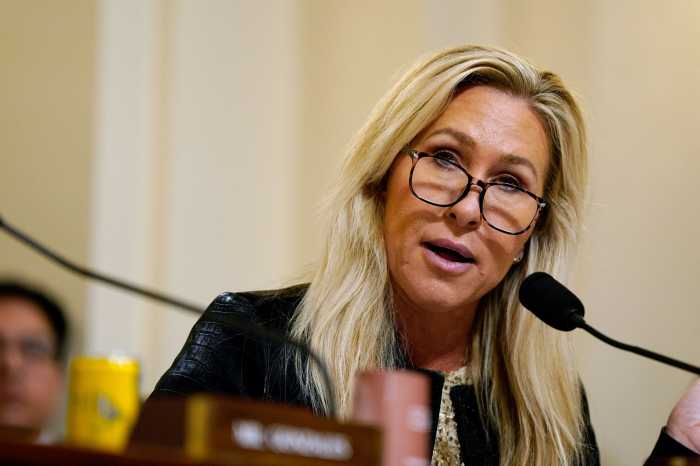With neither Ross Levi nor the Empire State Pride Agenda board that fired him last week having much, if anything, to say publicly about the events leading to the former executive director’s March 5 dismissal, others are speaking up –– and some of them, including two former leaders of the group, a top Paterson administration official, and a major philanthropic donor active in LGBT issues, are harshly critical of ESPA’s handling of the matter.
Meanwhile, Andrew Stern, a critic who is the chief operating officer at NARAL Pro-Choice New York, has stepped forward to say he withdrew from consideration for the post Levi assumed in May 2010 after being told by ESPA’s search firm that some board members were concerned about how well his “shticky Jewish humor” would serve the organization.
Still, with Pride Agenda board members privately defending Levi’s ouster and arguing that professional standards on the board have been strengthened in recent years, Andrew Cuomo’s former top deputy, Steven M. Cohen, who left his position as secretary to the governor last fall, described the board as lending Levi a critical, politically deft, and complementary assist in the successful push early last year to enact marriage equality legislation.
That victory, of course, is the measure by which many in the LGBT community will judge ESPA, though even New Yorkers buoyed by that achievement can be excused for scratching their heads about how the group’s executive director could fall so far so fast in its wake.
The group’s critics include many of the most prominent names in New York LGBT advocacy.
Charles J. O’Byrne, who served former Governor David Paterson in the same capacity Cohen held in the Cuomo administration, said the firing, first reported in Gay City News, “raises real questions about ESPA's future. To have board members attempting to denigrate the service of Ross –– an outstanding leader for our community –– isn't just unprofessional and undisciplined –– it is offensive.”
O’Byrne, who is also a former advisor to the Gill Action Fund, which does LGBT advocacy work and was active in the marriage fight in Albany last year, had been critical of ESPA when its expected appointment of Brian Ellner to the executive director post cratered at the last minute two years ago. Ellner –– who later joined the Human Rights Campaign (HRC) as the leader of that group’s marriage equality work in New York –– faced criticism in some quarters during the Pride Agenda search for his close ties to Mayor Michael Bloomberg, a supporter of some anti-gay Republican state senators, though neither Ellner nor ESPA ever spoke publicly about the details of what O’Byrne termed a “fiasco.”
Saying the Ellner and Levi episodes distract the group from what he described as “a lot to be done” yet on LGBT issues in New York, O’Byrne warned, “For many donors in town it is sadly already too late.”
Matt Foreman, who served as ESPA’s executive director for two stints, separated by little more than a year, between 1997 and 2003, was similarly outspoken about Levi’s firing.
“I am shocked, appalled, and disgusted,” he said. “It was handled extremely poorly, and it is extremely discouraging when somebody of Ross‘ service and record is treated so badly.”
Andrew Lane, the executive director of the Johnson Family Foundation, which has been an ESPA funder, responded to off-the-record board complaints that Levi failed to give the Pride Agenda sufficient visibility in the marriage win.
“The board’s termination of Ross is devastating,” he told Gay City News. “I think Ross did an extraordinary job. He stepped into his role at the 11th hour, and he handled himself with incredible grace and humility. I understand that humility has become a problematic word in the context of these boards.”
Levi himself has declined repeated requests by Gay City News to speak on or off the record about his departure, but some of those who praised him voiced no criticism of the Pride Agenda.
“My sense of things is that Ross did a great job for ESPA,” Ellner said. “He kept his focus on doing what would ensure we would win.”
Ellner said he called Levi after learning of the dismissal to pass along his praise for his efforts on the gay marriage law.
Alan Van Capelle, who preceded Levi as executive director, said, “Many if not most of the legislative achievements ESPA got in the last decade were for the most part due to Ross, and due to Ross’ legislative drafting abilities.”
Levi’s tenure at the Pride Agenda, in legislative counsel, public policy, and government affairs roles as well as 22 months at the helm, saw enactment of hate crimes legislation, a state gay rights law, a school anti-bullying measure, and same-sex marriage.
“Ross is a very different leader than I was,” Van Capelle said. “He was more low key than I had been. I was the type of leader that the organization needed at that time. And I think that Ross was the sort of leader the organization needed last year.”
Van Capelle was executive director from 2003 until early 2010, and was sometimes known for a contentious public style, particularly in a 2009 speech at the group’s fall dinner in Manhattan and in meetings with legislative leaders over the following two months, as he pressed the demand for a Senate vote on marriage equality. Though that vote fell short, 38-24, Van Capelle’s aggressive pursuit of marriage led to three successful votes in the State Assembly and was publicly backed with full-throated enthusiasm by Paterson, who was then governor.
Even while praising Levi, Van Capelle did not question the ESPA board’s action.
“Every organization should be able to choose its leaders,” he said. “I don’t think we should second-guess decisions that they make, but whatever decisions they made should not diminish what Ross has accomplished.”
Another former ESPA executive director, Joe Grabarz, who served a decade ago between Foreman’s two terms as leader, offered a stinging counterpoint to the confidence Van Capelle voiced in the board’s stewardship of the organization.
“I have to say that the Pride Agenda has one of the most dysfunctional and misbehaving boards around,” Grabarz said. “I can’t see why any rising star in LGBT politics would want to do this job. I don’t think they’ve ever had an executive director that they haven’t abused.”
Active in consulting and lobbying on progressive causes in Connecticut –– from transgender rights to stem cell research –– since leaving ESPA, Grabarz said, “I have not seen them making any cultural change since I was there.”
The criticism lodged against the Pride Agenda board was conveyed in detail to vice chairs Louis A. Bradbury and Marla Hassner, but they declined direct comment. The group’s communications director, Erica Pelletreau, reiterated their statement of a week before that ESPA “does not comment on personnel matters,” but added, “The board of directors of the Pride Agenda, like the board of any nonprofit organization, has both a fiduciary responsibility and a responsibility to see to it that we are adhering to our mission. In this case, the executive director reports to the co-chairs of the organization and has a responsibility to act in the best interest of the organization.”
Noting that the group’s immediate priorities are a transgender civil rights law, supporting “those who stood with us” in the legislative elections this fall, and seeking funding for the statewide network of LGBT social service agencies, Pelletreau said, “We are focusing on advancing that future.”
Two board members, speaking off the record, said that Bradbury, who assumed leadership of the board after the 2010 executive director hiring hiccup, had successfully worked to establish more professional board standards at the organization. Both said Levi chafed at board accountability efforts.
Some of ESPA’s critics, however, said the board undercut Levi when it directed a prominent member, Jeff Soref, who has a relationship with the organization dating back more than 15 years, to participate in high level Albany meetings aimed at getting the marriage bill done. Even some advocates involved day to day in that effort expressed surprise at Levi’s patience with such direct board oversight.
Cohen, the former secretary to the governor who personally oversaw the Cuomo administration’s marriage effort, however, offered a glowing assessment of the role Soref played in the State Senate push.
Describing him as someone with “a broad sense of how to work with a coalition of groups and get them pushing in the same direction,” Cohen said, “Jeff’s participation was a very important signal to people, important people in terms of raising money for the effort. Along the way, there were a couple of people who stepped beyond the organizational role they played and were of great personal assistance to the process and to the governor –– in terms of giving advice and lending credibility to the effort.”
Soref, himself, said that after the community was “blindsided” by the lopsided Senate vote against marriage in December 2009, “The board felt that it would be useful to have a second person there. Not to supervise, not to watch Ross in any way, just as a reality check.” Noting that he raised a lot of money –– both in meeting ESPA’s financial obligation to the coalition of groups working on the bill and in supporting friendly legislators –– he added, “Look, nobody likes it when a second person comes along, but I don’t think Ross would have said anything different about how things worked.”
In a drama chockablock with widely divergent accounts and opinions, no element is more disturbing that the story NARAL’s Stern tells about his experiences seeking the top job at ESPA in 2010. He first became concerned with the process, he said, when he read in the New York Post that a gay leader at the pro-choice group was among the top contenders for the position. The Post didn’t quite have the story right –– reporting that Kelli Conlin, the out lesbian who then led the group, was that candidate. Stern said it was apparent to his bosses at NARAL that he, in fact, was the gay person seeking the job, and he told the search firm he was unhappy with the breach of his confidentiality.
According to Stern, he soon after heard from an individual close to the board that search committee members expressed the view that he might be “too ethnic” to serve a statewide group effectively. When he raised that with the search firm, he said, he was told several board members thought his “shticky Jewish humor” might not go over with every audience. Offended that an ethnic slur was part of the discussion about his candidacy, Stern withdrew from contention.
Hassner and another board member, he said, left him a voicemail message to emphasize that the comments did not reflect “the values” of the ESPA board, but Stern said he did not return the call.
He acknowledged that in coming forward with the allegations, he runs the risk of looking bitter for not having gotten the job, and explained that that consideration and his unwillingness to sully either Ellner or Levi led him to remain silent in 2010. After learning of Levi’s dismissal, however, he decided that “the board’s behavior is both so despicable and emblematic of an endemic problem that I genuinely felt I had no choice but to come forward.”
One board member, speaking off the record, noting that Van Capelle, Levi, and Ellner are Jewish, cast doubt on Stern’s story, asking why he did not speak out at the time and wondering if his account weren’t simply sour grapes.
Four sources who spoke to Gay City News, including another board member, confirmed –– several of them unprompted –– that they had heard of Stern’s concerns at the time or shortly after he withdrew his candidacy.
Hassner and Bradbury declined to comment on Stern’s charges, and Pelletreau said, “It would be inappropriate and not fair to comment on any candidate, especially with a new search underway.”

































